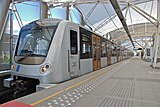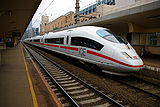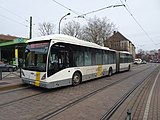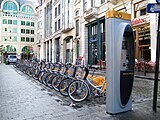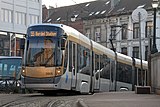Brussels has an extensive network of both private or public transportation means. Public transportation includes Brussels buses, trams, and metro (all three operated by STIB/MIVB), as well as a set of railway lines (operated by Infrabel) and railway stations served by public trains (operated by the SNCB/NMBS). Air transport is available via one of the city's two airports (Brussels Airport and Brussels South Charleroi Airport), and boat transport is available via the Port of Brussels. Bicycle-sharing and car-sharing public systems are also available. The city is relatively car-dependent by northern European standards and is considered to be the most congested city in the world according to the INRIX traffic survey.[1]
The complexity of the Belgian political landscape makes some transportation issues difficult to solve. The Brussels-Capital Region is surrounded by the Flemish and Walloon regions, which means that the airports, as well as many roads serving Brussels (most notably the Brussels Ring) are located in the other two Belgian regions. In the Brussels Region itself, two ministers are currently responsible for transport: Pascal Smet for public transport and the Port of Brussels and Bruno De Lille for other transportation topics.
- ^ "Brussels and Antwerp have worst traffic". Flanders Today. 27 June 2012. Retrieved 8 December 2013.
